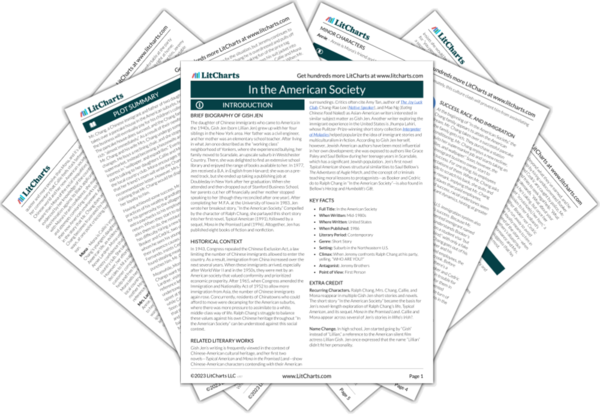After Mr. Chang becomes wealthy from running his pancake shop, Mrs. Chang starts showing interest in joining the country club. She has reservations, such as the necessity of a referral letter from a current member, but her daughter Mona—who wants to swim in the country club pool—makes light of these concerns, telling her mother, “Annie’s mom’d write you a letter in a sec.” Soon after, Annie’s mom, Mrs. Lardner, shows up at the Changs’ house and insists she would be “honored and delighted” to write a letter for “you people” (the Changs). She confides to Mrs. Chang, “It’s a secret of course, but […] my natural father was Jewish. Can you see it? Just look at my skin.” From these remarks, it’s clear that Mrs. Lardner assumes that to be non-white or non-Christian is to have something to hide—hardly a comforting sentiment to share with her Chinese acquaintances. Moreover, her comparison between being secretly half-Jewish and being Chinese suggests that she sees some equivalence between her situation and the Changs’, but her conclusion is ill-conceived, as she is able to hide her heritage and join the country club, which the Changs cannot do.
After the Changs are declined membership in the country club, Mrs. Lardner invites them to a “bon voyage bash” she is throwing for her friend Jeremy Brothers, promising introductions to other country clubbers to help with future membership bids. When the Changs arrive, however, they are treated less like guests than imposters or service workers. One navy veteran speaks to Mrs. Chang about his time stationed “in the Orient” and attempts to speak Chinese; meanwhile, Mrs. Lardner corners Callie into serving hors d’oeuvres. The most egregious offense comes from Jeremy Brothers, who drunkenly shouts at Mr. Chang, “This is my party, my party, and I’ve never seen you before in my life,” before bellowing, “WHO ARE YOU?” Although Mrs. Lardner rushes over and Jeremy apologizes, their casually racist behavior sends a clear unwelcoming message and implies that the Changs will struggle to fit in no matter how successful they are in other ways. These scenes suggest that the sense of belonging immigrants might experience in the U.S. is often illusory and compromised by racist behavior, even from those who claim to accept them.
The Illusion of Belonging ThemeTracker

The Illusion of Belonging Quotes in In the American Society
“You know, the Chinese have a saying,” said my mother. “To do nothing is better than to overdo. You mean well, but you tell me now what will happen.”
Of course, my father tried to eat a cracker full of shallots, and burned himself in an attempt to help Mr. Lardner turn the coals of the barbecue; but on the whole, he seemed to be doing all right. Not nearly so well as my mother, though, who had accepted an entire cupful of Mrs. Lardner’s magic punch and indeed seemed to be under some spell. […] I watched my mother take off her shoes, laughing and laughing as a man with a beard regaled her with navy stories by the pool. Apparently he had been stationed in the Orient and remembered a few words of Chinese, which made my mother laugh still more.
Jeremy began to roar. “This is my party, my party, and I’ve never seen you before in my life.” My father backed up as Jeremy came toward him. “Who are you? WHO ARE YOU?”
“Take off your shirt.”
“I do not taking orders like a servant,” announced my father stiffly.
“Take off your shirt, or I’m going to throw this jacket right into the pool, just right into this little pool here.” Jeremy held it over the water.
“Go ahead.”
“One hundred twelve-fifty,” taunted Jeremy. “One hundred twelve …”
My father flung the polo shirt into the water with such force that part of it bounced back up into the air like a fluorescent fountain. Then it settled into a soft heap on top of the water.
“You girls are good swimmers,” he said finally. “Not like me.”
Then his shirt started moving again, and we trooped up the hill after it, into the dark.











